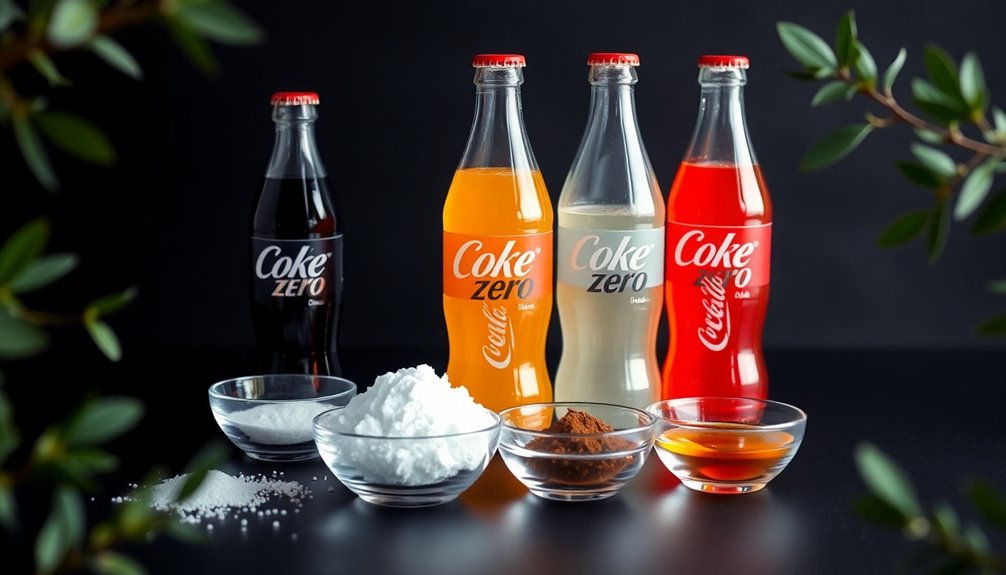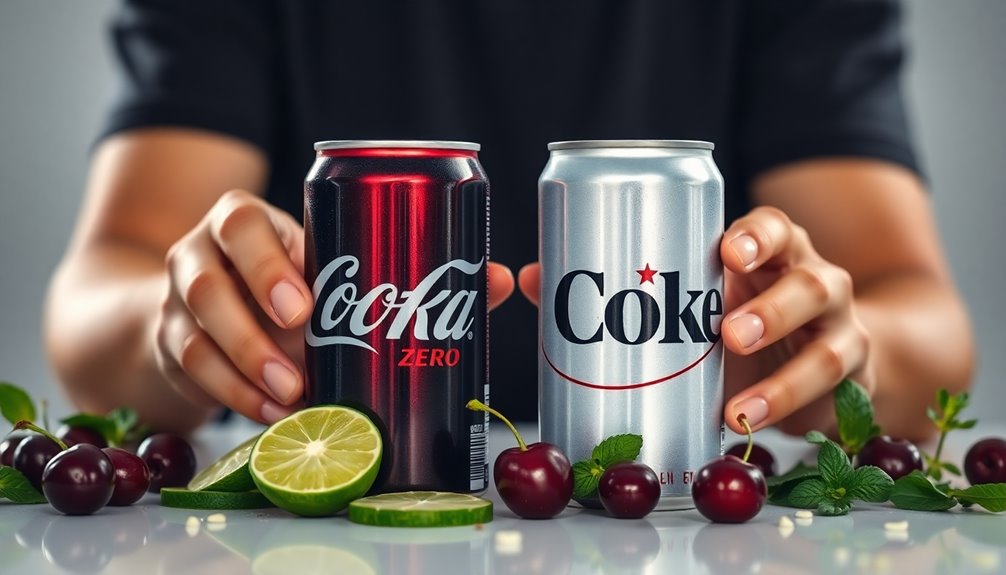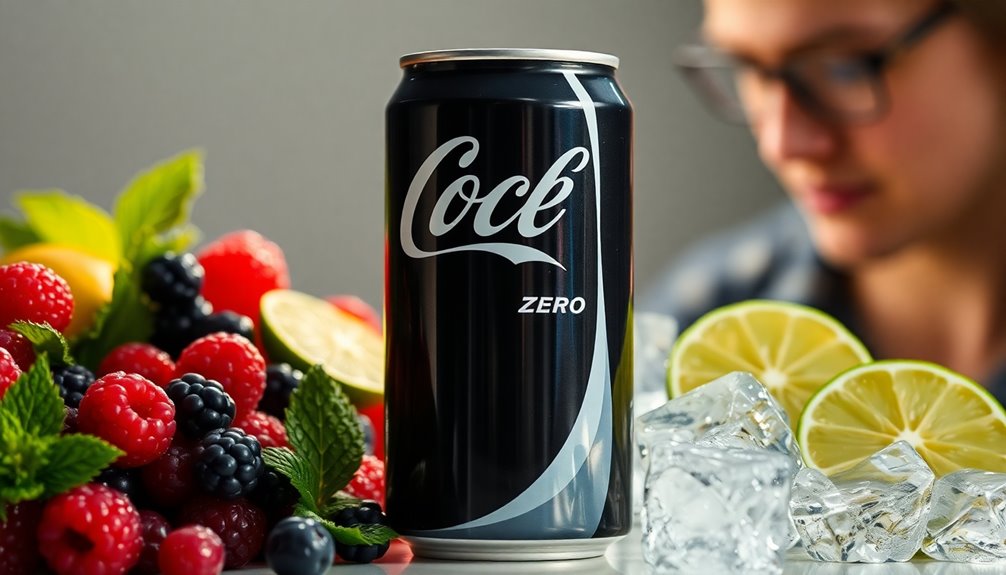Coke Zero is calorie-free and contains carbonated water, caramel color, phosphoric acid, aspartame, and acesulfame potassium. While it offers a sweet flavor without calories, those artificial sweeteners may lead to increased cravings, weight gain, and gut health issues over time. Be cautious; phosphoric acid could also affect your dental health and bone density. Plus, its caffeine content may impact your sleep. Understanding these ingredients and their potential risks can help you make better choices. There’s a lot more to uncover about Coke Zero and its alternatives that might surprise you. For example, many people are unaware of the surprising caffeine levels in Pepsi, which can also affect their sleep and overall health. It’s important to stay informed about the ingredients and nutritional content of the beverages you consume, and to consider the potential long-term effects on your body. Exploring alternative options with natural sweeteners and lower caffeine levels may be worth considering for a healthier lifestyle.
Key Takeaways
- Coke Zero is calorie-free, containing no fat, protein, or sugar, but includes artificial sweeteners like aspartame and acesulfame potassium.
- Key ingredients such as phosphoric acid can erode tooth enamel and affect bone density with excessive consumption.
- Regular consumption of Coke Zero may lead to increased cravings for sweet foods and potential weight gain or metabolic syndrome.
- While FDA-approved, artificial sweeteners in Coke Zero remain controversial, with mixed research outcomes regarding obesity and diabetes risks.
- Alternatives like flavored waters, herbal teas, and natural juices are gaining popularity as healthier beverage choices.
Nutritional Profile of Coke Zero

When you consider the nutritional profile of Coke Zero, you'll find it offers a calorie-free beverage option that appeals to those watching their weight.
With 0 calories, 0 grams of fat, protein, and sugar per 12-ounce can, Coke Zero seems ideal for weight management. Its ingredients include carbonated water, caramel color, phosphoric acid, aspartame, and acesulfame potassium.
While it provides 2% of the Daily Value for sodium and potassium, it lacks essential vitamins and minerals, offering little nutritional value.
The caffeine content of 34 mg can influence sleep and anxiety levels, which is worth noting.
While it's marketed as a low-calorie drink, be aware of potential health risks associated with its artificial ingredients. Additionally, consumption of beverages with artificial sweeteners has been linked to various health concerns, making moderation important.
Health Effects of Artificial Sweeteners

While many people turn to Coke Zero and similar beverages for their low-calorie appeal, the health effects of artificial sweeteners like aspartame and acesulfame potassium deserve careful consideration.
Although these ingredients are FDA-approved, their long-term health effects remain controversial. Research suggests that regular consumption of diet sodas may lead to weight gain and even metabolic syndrome, counteracting your weight management efforts.
Additionally, high intake can trigger cravings for sweet foods, impacting your overall diet. Studies also indicate that artificial sweeteners might negatively affect gut health by disrupting gut microbiota balance.
Finally, concerns about potential links to stroke and dementia highlight the need for further research into the safety of these sweeteners, especially with ongoing discussions about their carcinogenic potential.
Risks to Dental Health

If you enjoy Coke Zero, you might want to evaluate its impact on your dental health.
The phosphoric acid in the drink can erode tooth enamel over time, increasing your risk of cavities.
Regular check-ups with your dentist can help you manage these risks and keep your smile healthy.
Acidic Beverage Impact
Although many enjoy Coke Zero for its calorie-free sweetness, its acidic nature poses significant risks to dental health. This beverage contains phosphoric acid, which can lead to tooth erosion and increased dental decay.
Research shows that even Coca-Cola Light caused noticeable tooth erosion in cows' teeth within just three minutes of exposure. While Coke Zero is less erosive than some other drinks, its long-term consumption can still wear away tooth enamel.
The acidity it contains emphasizes the need for moderation to protect your oral health. Regular dental check-ups become essential to monitor any changes. Additionally, maintaining proper airflow around your living space can help minimize exposure to airborne irritants that may exacerbate dental health issues.
Be mindful of the ingredients in Coke Zero, as enjoying it too often might cost you more than just a sweet treat.
Erosion Risk Factors
Consuming Coke Zero and other acidic drinks can greatly increase your risk of dental erosion. The acidity, especially from phosphoric acid, weakens tooth enamel over time. While Coke Zero might be less erosive than some drinks, regular consumption still poses risks for significant dental issues.
| Beverage Type | Erosive Potential | Recommended Action |
|---|---|---|
| Coke Zero | Moderate | Limit consumption |
| Sprite | High | Avoid frequent intake |
| Fruit Juices | High | Opt for alternatives |
| Water | Low | Drink regularly |
To protect your dental health, maintain good oral hygiene and schedule regular dental check-ups to monitor enamel loss and overall tooth health.
Weight Management and Diabetes Connection

When you choose Coke Zero, you might think you're making a smart choice for weight management, but the reality isn't so straightforward.
Some studies suggest that drinking diet beverages could actually increase your risk of obesity and diabetes over time. Additionally, these drinks may lead to increased cravings for sugary foods, which can be counterproductive to weight loss efforts. It's worth considering how these drinks might affect your cravings and long-term health.
Diet Drinks and Obesity
Many people turn to diet drinks like Coke Zero in hopes of managing their weight, believing these beverages can help reduce calorie intake. However, research shows mixed outcomes regarding their impact on obesity.
Consuming over 21 diet drinks weekly can nearly double your obesity risk, pointing to potential long-term health effects. While you might experience lower total daily calorie intake, the connection between artificial sweeteners and increased cravings for sweet foods complicates effective weight management.
In addition, some studies suggest that these drinks may heighten the risk of developing type 2 diabetes. The long-term effects on your metabolic health remain unclear, highlighting the need for caution when relying on diet drinks like Coke Zero for weight control.
Diabetes Risk Factors
The relationship between weight management and diabetes risk is complex, especially when considering the role of artificially sweetened beverages like Coke Zero. Despite its low-calorie appeal, research suggests that regular consumption could increase diabetes risk.
A study indicates that those drinking over 21 diet beverages weekly might nearly double their obesity risk, a significant contributor to diabetes development. Additionally, Coke Zero may be linked to metabolic syndrome, a cluster of conditions heightening heart disease and diabetes risks.
Conflicting research exists; while some studies find no connection between diet soda and prediabetes, others hint at a potential link. Given these uncertainties, more research is needed to fully understand the health effects of sugar substitutes like Coke Zero on weight management and diabetes risk.
Long-Term Health Effects
While Coke Zero might seem like a harmless alternative to sugary drinks, its long-term health effects raise significant concerns, particularly regarding weight management and diabetes risk.
Studies show that regular consumption of Coke Zero and other artificially sweetened beverages may increase the risk of type 2 diabetes, with heavy drinkers possibly doubling their risk.
An 8-year study linked over 21 diet beverages per week to nearly double the obesity risk, suggesting these drinks can hinder weight management.
Additionally, while some research suggests diet options may support moderate weight loss, conflicting studies indicate they can lead to cravings for sweet foods, potentially promoting weight gain.
These mixed findings emphasize the need for further research on Coke Zero's long-term health impacts.
Consumer Trends and Alternatives

As consumers become more aware of the potential health risks linked to artificial sweeteners, interest in Coke Zero is shifting towards healthier alternatives. Many are opting for options that prioritize natural ingredients and lower acidity.
| Healthier Alternatives | Benefits | Popular Choices |
|---|---|---|
| Natural Juices | Nutrient-rich | Orange, Apple |
| Flavored Waters | Low-calorie | Cucumber, Berry |
| Herbal Teas | Antioxidants | Chamomile, Mint |
| Sparkling Water | Hydrating & rejuvenating | Lemon, Lime |
With market trends reflecting these shifts, moderation in Coke Zero consumption is recommended. Checking ingredient lists can help you choose beverages that align with your health goals, especially for maintaining dental health. Additionally, opting for whole, unprocessed foods can contribute to a more balanced diet.
Ingredient Breakdown and Composition

With a growing focus on healthier beverage choices, understanding what's in Coke Zero becomes important for consumers. This drink, often marketed as calorie and sugar-free, contains several key ingredients.
You'll find carbonated water, caramel color, and phosphoric acid among them. The caramel color can produce 4-methylimidazole (4-MEI), a potential carcinogen. Aspartame, another ingredient, has been linked to health concerns like oxidative stress and possible weight gain.
Additionally, phosphoric acid can negatively affect bone density and increase the risk of kidney disease if consumed excessively. Coke Zero also includes potassium citrate and acesulfame potassium, contributing to about 2% of your daily potassium needs per serving.
Being informed about these ingredients can help you make healthier choices.
Comparing Coke Zero and Diet Coke

Coke Zero and Diet Coke offer distinct experiences, appealing to different taste preferences among consumers. Here's how they compare:
- Sweeteners: Coke Zero combines aspartame and acesulfame potassium, while Diet Coke primarily uses aspartame.
- Caffeine: Diet Coke packs 46 mg of caffeine per 12-ounce serving, making it slightly more stimulating than Coke Zero's 34 mg.
- Flavor Profiles: Coke Zero aims for a taste closer to regular Coca-Cola, whereas Diet Coke has a unique flavor that some find reminiscent of traditional diet sodas.
- Zero-Calorie: Both beverages are marketed as zero-calorie options, but consumer preferences often sway towards one based on taste.
Consider the risks and benefits of each as you choose your favorite between Coke Zero and Diet Coke!
Frequently Asked Questions
Is There Anything Unhealthy About Coke Zero?
Yes, there are some health concerns linked to Coke Zero.
You might be consuming artificial sweeteners like aspartame and acesulfame potassium, which have potential risks, including weight gain and metabolic issues.
The acidity can harm your teeth, leading to erosion over time.
Regular intake could raise your chances of stroke and dementia.
Plus, ingredients like caramel color may pose long-term health risks.
It's wise to take into account these factors before making Coke Zero a regular choice.
What Zero Soda Has No Aspartame?
If you're on the hunt for a bubbly treat without aspartame, you've got some delicious options!
Pepsi Zero Sugar offers a sweet kick without any of that artificial flavor.
Zevia's sodas are sweetened with stevia for a natural twist, and Bubly sparkling water is invigoratingly pure, containing no sweeteners at all.
You might also enjoy Spindrift, which adds a splash of real fruit juice for flavor.
Enjoy your guilt-free fizz!
Is 2 Cans of Coke Zero a Day Bad?
Drinking 2 cans of Coke Zero daily mightn't seem harmful at first glance, but there are potential risks to weigh.
It could increase your cravings for sweet foods and might lead to metabolic issues over time. Plus, the acidity can affect your dental health.
While you're under the FDA's acceptable intake for aspartame, it's essential to stay aware of the ongoing debates about long-term effects and adjust your consumption accordingly.
Moderation is key!
What Is the Healthiest Coke to Drink?
You might think Coke is just Coke, but when it comes to health, choices matter.
If you're looking for the healthiest option, you can't go wrong with sparkling water or flavored herbal teas. They hydrate without the sugars or artificial ingredients found in sodas.
If you really want a Coke, opt for Coke Zero instead of regular Coke, but remember, moderation's key to maintaining your well-being.
Enjoy your drink, but choose wisely!
Conclusion
In the end, choosing Coke Zero can feel like walking a tightrope—balancing your cravings with health concerns. Just like a tightrope walker needs focus and practice, you'll need to stay informed about artificial sweeteners and their impacts. A 2021 study showed that those who consume diet sodas regularly may be 20% more likely to gain weight. So, as you sip that fizzy drink, remember to weigh your choices carefully, just as a performer weighs each step on the line.










